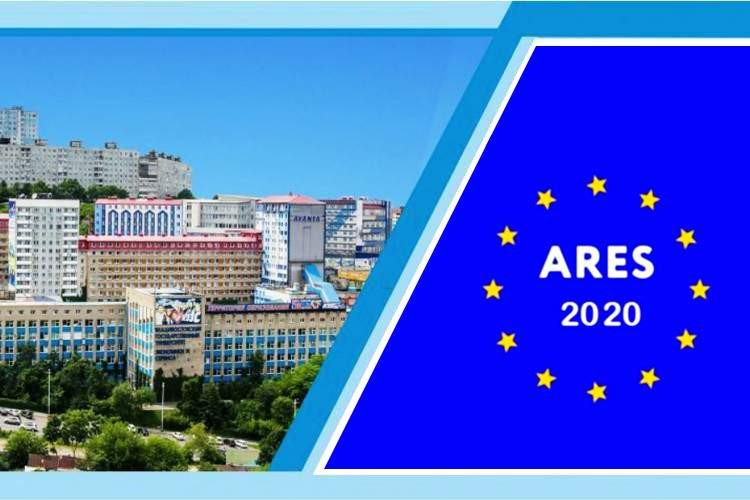Major breakthrough of VSUES in the international rating ARES-2020

The data processing of the international rating in higher education institutions ARES-2020 has ended. VSUES not only entered the hundred of the best universities in Russia, but also rose nine positions - took the 76th line of the rating and received the highest rating from category «B» - category BBB +.
The international ARES rating has been existed for the 9th year. Processing in ARES takes place automatically, excluding the so-called human factor, and the European higher education standards are accepted as criteria in the evaluation, which have been discussed in detail at forums and conferences and have been approved by the BFUG Bologna Coordination Group and approved by the EU Conference of Ministers of Higher Education.
This year, 278 Russian universities passed the assessment. Compared with the previous year, 2019, the number of participants among Russian universities has increased by 80 universities. Despite the growing competition, VSUES strengthened its position in the general list and took 76th line and received the highest category of assessment of the quality of teaching, research and the demand for graduates by employers - BBB +. Last year, the university ranked 85 out of 198 and had the category BB. Now VSUES takes the second position after Omsk State University. F.M. Dostoevsky.
Thus, VSUES not only improved its position in the rating, but also rose qualitatively - into three categories at once. Among the economic universities, VSUES ranks the fourth place in the country after the Financial University under the Government of the Russian Federation (the 10th place and category AA +), Russian Economic University. G.V. Plekhanov (the 33rd place and category A +), St. Petersburg State University of Economics (the 53th place and category A), passing this year the State University of Management (the 79th place and category BBB +) and the Russian Economic School the (89th place and category BBB + )
In addition to VSUES, only two federal universities were included in the TOP-100 universities of Russia from the Far Eastern Federal District: FEFU – the 17th place (in 2019, 31) - category AA; Siberian Federal University M.K. Ammosova (Sakha Yakutia) – the 44th place (27 in 2019) - category A +.
The others universities of the Far Eastern Federal District rank from 120 to 159 with the categories BBB and BB.
The detailed information about the ARES rating, its significance and its difference from the most famous international ratings was shared by Lyudmila Kravchenko, Director of the Monitoring and Forecasting Department of VSUES:
- Over the 9 years of the existence of the rating, the number of participating universities has increased 20 times and reached the largest international rating THE (Times Higher Education). What is the success of ARES? Why do major rating agencies consider ARES results in their final assessments? Why are ARES results sought after by many public and private organizations? Rather, ARES differs from other international ratings in its objectivity. For example, the most cited international rating in the world ARWU is based on the number of graduates and employees awarded the Nobel Prizes and the Fields medals, articles published in Nature and Science magazines, not taking into account how important the university is in the development of the region, the university’s relationship with potential employers and the presence of an innovative infrastructure that allows employees and students actively participate in scientific work.
The QS rating works according to a different scheme: experts are randomly selected from among well-known specialists who are offered to evaluate a particular university for short time. So, for example, a scientist from France - a specialist in powder metallurgy - QS proposed to evaluate a humanitarian university from St. Petersburg. He studied the university’s website for a long time, but then he wrote an appeal to ARES for help. Unfortunately, this is not an isolated case.
ARES uses modern information technology, which allows collect and process a large amount of data by the automatic way annually. In addition, each year ARES issues a questionnaire (download the questionnaire here: Questionnaire ARES-2020). Thus, the ARES database is updated and improved every year. In this aspect, ARES differs from the rating of THE (Times Higher Education) in which, if there is not enough data for a specific university, Times Higher Education replaces these data with the average data for the region, very similar to the «average temperature in the hospital».
The main criteria of ARES are the quality of education and strategies for its improvement. The main duty of the university is to provide excellent education. Of 100% of the grading scale, ARES gives 35% —the assessment of education (this includes: the use of new technologies in education, monitoring the quality of education, teacher training, the creation of innovative infrastructures, etc.) and only 20% - to research. (Unlike him, THE Times Higher Education equates education to scientific activity at 30%). 15%- to international activities, 15% - to communication with employers and 15% - to the regional importance of the university. This approach allows humanitarian universities, along with technical ones, to take their rightful place in the rating.
REFERENCE:
The rating passes through 3 categories of ratings:
- Category A (AAA, AA +, AA, A +, A): High quality teaching, research and demand for graduates by employers (High quality performance)
- Category B (BBB +, BBB, BB +, BB, B +, B): Reliable quality of teaching, research and the demand for graduates by employers (Good quality performance)
- Category C (CCC +, CCC, CC +, CC, C +, C): Adequate quality of teaching, research and graduate demand by employers (Sufficient quality performance)
- Category D (DDD +, DDD, DD +, DD, D +, D): Inadequate quality education of scientific activity and demand for graduates by employers with significant risk (Conditional failure)





